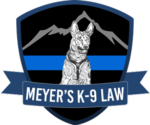School Sniffs; Vehicle Search; Alert as Probable Cause
Subject complains that PSD sniffs at a school violated his constitutional rights and that LE retaliated against him for objecting to the PSD school sniffs. The motions to dismiss brought by LE were granted as subject did not comply with the court’s procedures or plead any facts that would support his claims.
The school district had a student vehicles policy that student had to purchase and display permits if they wanted to park on district property. The policy also stated that vehicles parked on district property were subject to unannounced searches by school personnel or drug dogs. In addition, permission for a student to park on district property was conditioned upon written consent of the search of the vehicle and all containers therein by a school administrator with reasonable suspicion of violation of a law, school rule or a condition that endangers the safety and health of student driver or others. The policy also stats that the district administrator may request that law enforcement conduct drug searches with a drug dog. The student does not have to be present for any search of the student’s vehicle based on an indication by a drug dog.
In this case, this school issued permits with the condition that student vehicles parked on school property are subject to search without notice. By choosing to park a vehicle on school property, the student and/or their parents have given permission to search the vehicle by school personnel, police officers and/or their K9 officer.
Subject had three daughters enrolled at the school. Subject filled out a registration form so that one of his daughters could park in the school lot. In December of that school year, it was decided to have a PSD team sniff for drugs at the high school. During the sniff, the school would be placed on administrative hold, meaning that the students and staff were required to stay in their assigned classrooms. The hold lasted about one class period and there was no deviation from the regular schedule of classes. Lockers and vehicles were sniffed and where PSDs alerted, searches were performed. PSD alerted to subject’s daughter’s car. Daughter was located and asked to provide keys to search the vehicle. Daughter handed over the keys and made no objection to the search. She was then interviewed for about 10 minutes. Her sister was also interviewed for about 10 minutes. Both denied possessing or using drugs. No drugs or contraband were located in the vehicle. Subject arrived at the school to complain about the school lunch program where he quarreled with the dean of students.
Among the many causes of action alleged, one of them was that the search of his daughter’s vehicle was unconstitutional. The court held that the PSD’s alert provided probable cause to search the vehicle. Subject’s claims that the school district could not call in police to do searches was irrelevant because it is well settled law that police do not have to have any articulable reason to sniff vehicles if doing so does not otherwise invade a person’s legitimate interest in privacy and a drug sniff that occurs in a public space does not invade a legitimate expectation of privacy. And in this case, subject had consented to the search at the time the vehicle was registered to park at the school.
